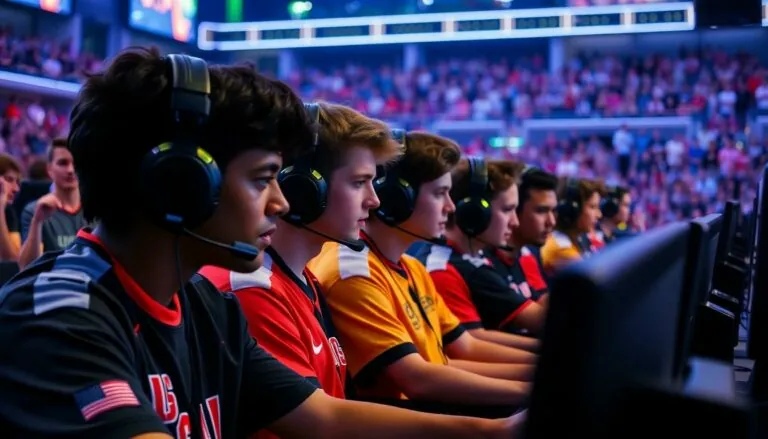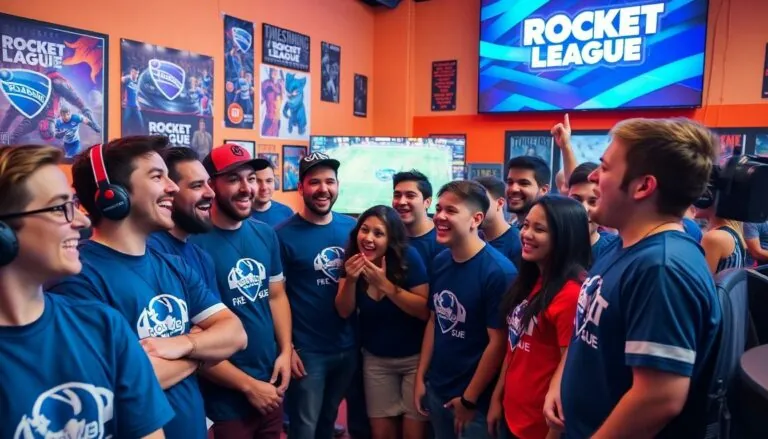In a world where gaming has gone from basement obsession to Olympic-level competition, colleges are catching on to the esports craze. Picture this: students trading textbooks for headsets, forming teams that could rival pro leagues. It’s not just about playing games; it’s about strategy teamwork and yes, the occasional pizza-fueled all-nighter.
Table of Contents
ToggleOverview of Esports in Higher Education
Esports has become a significant part of higher education, transforming the landscape of collegiate sports. Many universities now offer esports teams, providing students with opportunities to compete at national and international levels. Teams often participate in tournaments for popular games like League of Legends, Overwatch, and Dota 2.
Scholarships for esports are on the rise, similar to traditional sports, attracting talented players who excel in gaming strategies and teamwork. Institutions promote inclusivity and diversity by encouraging students from various backgrounds to join esports programs. Participation in these programs fosters community engagement and helps build skills applicable to various career paths.
Data from the National Association of Collegiate Esports shows that over 70 colleges established esports programs as of 2023. These programs not only support competitive gaming but also underpin academic initiatives like game design and digital media studies. Partnerships with game developers often enhance the educational experience, allowing students to interact with industry leaders.
Students engaged in esports benefit from improved communication and problem-solving skills, essential for the modern workforce. School spirit gets amplified, as esports events draw crowds and create a vibrant campus culture. Understanding the strategic elements of games promotes critical thinking and fosters teamwork among participants.
Overall, the integration of esports into higher education reflects broader cultural shifts, creating pathways for future careers within the gaming industry.
Benefits of Joining Esports Teams
Joining esports teams offers numerous advantages for college students. Participation in these teams fosters essential skill development and enhances community engagement, contributing to personal and professional growth.
Skill Development
Students refine various skills through competitive gameplay. Communication enhances as team members coordinate strategies during matches. Critical thinking emerges when players analyze opponents’ moves and adjust their tactics. Time management becomes crucial, especially during busy academic schedules. Students may also improve technical skills related to gaming software and hardware, which lays a foundation for careers in tech and digital media. Scholarships offer an additional incentive, drawing in talented players who strive to excel in both esports and academics.
Community Engagement
Esports fosters a strong sense of community among participants. Students come together, forming friendships and support networks that extend beyond the gaming realm. Campus events that showcase esports competitions create excitement and boost school spirit, uniting diverse student bodies. College esports teams also engage with local and global gaming communities, building connections that enhance social experiences. By participating in outreach initiatives, students can promote inclusivity, encouraging broader participation in gaming and related fields. Such engagement reflects a growing cultural acceptance of esports as a legitimate and valuable aspect of campus life.
Top Colleges with Esports Teams
Colleges increasingly embrace esports, offering students competitive gaming opportunities. Many institutions now field dedicated esports teams that compete at high levels.
Ivy League Institutions
Ivy League schools are joining the esports movement. Yale University has developed a robust esports program, featuring teams that compete in games like League of Legends and Overwatch. Princeton University reflects this trend with its esports club, promoting engagement and skill development among students. Harvard University also hosts esports events, fostering a competitive spirit while encouraging teamwork.
State Universities
State universities lead in the establishment of esports teams. University of California, Irvine boasts one of the premier esports programs, providing scholarships for talented players. University of California, Berkeley participates actively in tournaments, supporting diverse gaming initiatives. Florida State University emphasizes academic integration through its esports program, nurturing skills in game design and digital media.
Community Colleges
Community colleges are also making strides in esports. Many institutions recognize the value of competitive gaming for student engagement. For example, Lone Star College has implemented a successful esports program that encourages teamwork and leadership skills. Similarly, Northern Virginia Community College offers a platform for students to develop their gaming skills while fostering community bonds.
Criteria for Choosing the Right College
Choosing the right college for esports involves various factors. Team performance, scholarship opportunities, and overall program quality play significant roles.
Team Performance
Team performance often serves as a key indicator of a college’s competitive edge in esports. Students should evaluate the success rates, including tournament wins and national rankings, of the teams they consider. Tracking metrics like win-loss records and participation in major competitions provides insight into a program’s strength. Prospective students can observe how teams collaborate and improve over time. Engaging with current team members or attending live events also reveals team culture. Ultimately, a solid track record enhances a college’s appeal for aspiring esports athletes.
Scholarship Opportunities
Scholarship opportunities in esports have expanded across many colleges. Students seeking financial support can find lucrative scholarships available for talented players. Institutions like the University of California, Irvine, and Florida State University offer substantial funding to attract skilled gamers. Scholarships can vary in amount, ranging from partial tuition to full coverage, reflecting the college’s commitment to esports. Recognizing the value of diverse talent, schools increasingly aim to promote inclusivity through these financial incentives. Exploring scholarship options early empowers students to maximize their educational experience while pursuing their gaming passion.
Conclusion
The rise of esports in colleges marks a transformative shift in student engagement and competitive opportunities. As universities embrace this phenomenon, they’re not just fostering gaming skills but also cultivating essential life skills that benefit students in various fields.
With the increasing availability of scholarships and robust programs, aspiring gamers have more avenues than ever to pursue their passions while gaining a quality education. This evolving landscape not only enhances the collegiate experience but also prepares students for future careers in the thriving gaming industry.
As esports continues to grow, it’s clear that the impact on higher education will resonate for years to come, uniting students and promoting a vibrant community around shared interests.





